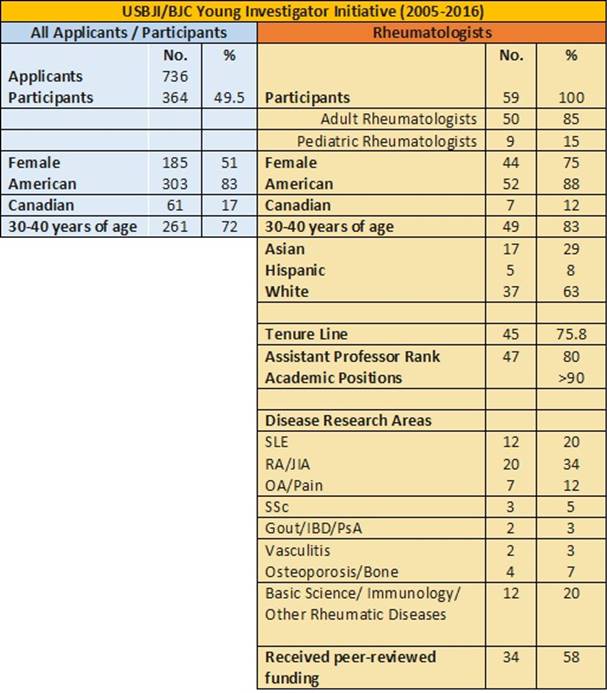Session Information
Date: Sunday, November 5, 2017
Title: Education Poster
Session Type: ACR Poster Session A
Session Time: 9:00AM-11:00AM
Background/Purpose: The success of a physician scientist in academic rheumatology requires effective skills to obtain peer-reviewed funding. The number of NIH-funded junior investigators is low in proportion to the prevalence of musculoskeletal (MSK) diseases. As well-conceived and structured research is more likely to be funded, in 2005 the U.S. Bone and Joint Decade/Initiative (USBJI) and Bone and Joint Canada initiated a grant mentoring and career development program for junior faculty in all fields of MSK research in the US/Canada who had not obtained an Independent Peer Reviewed Research Grant (RO1/equivalent) in order to foster the next generation of investigators. The purpose of this study was to determine the outcomes of Rheumatologists who attended the program 2005-2016.
Methods: The Young Investigator Initiative (YII) program included two 2-day workshops held 12-18 months apart with training in specific aspects of the development of well-founded research studies and grantsmanship (specific aims, experimental design, budget, collaborations), benefitting from multi-disciplinary perspectives on their proposed studies. Each mentee was assigned 2-4 experienced external mentors from the YII faculty to complement their institutional mentors until the Young Investigator obtained funding. Mentors made themselves available to assigned mentees for review of specific aims, evaluating grant drafts, and discussing research strategies. External mentors’ research expertise across the MSK disciplines included rheumatology, epidemiology, orthopaedics, bioengineering, biology, PTs, OTs.
Results: The YII is a competitive, peer-reviewed program. Of 736 applicants 2005-2016, 364 (49.5%) were accepted, including 59 Rheumatologists developing studies in common and less common forms of Rheumatic disease. Program metrics are tabulated in Table 1. Total external funding obtained by YII Rheumatology participants 2005-2016 is $48.5 million, from a combination of NIH/Canadian Institutes of Health Research/Foundations/Granting Agencies/Institutions, including the ACR-RRF; 34/59 (58%) received peer-reviewed funding.
Conclusion: The YII program has been successful in assisting junior investigators in academic rheumatology obtain peer-reviewed funding by providing education and external mentoring on grant structure and writing until funding is obtained.
To cite this abstract in AMA style:
Lane NE, Rosenthal A, Hillstrom H, Puzas E. Training the Next Generation of Investigative Rheumatologists: Results of the Usbji’s Young Investigator Initiative for Academic Rheumatologists [abstract]. Arthritis Rheumatol. 2017; 69 (suppl 10). https://acrabstracts.org/abstract/training-the-next-generation-of-investigative-rheumatologists-results-of-the-usbjis-young-investigator-initiative-for-academic-rheumatologists/. Accessed .« Back to 2017 ACR/ARHP Annual Meeting
ACR Meeting Abstracts - https://acrabstracts.org/abstract/training-the-next-generation-of-investigative-rheumatologists-results-of-the-usbjis-young-investigator-initiative-for-academic-rheumatologists/

